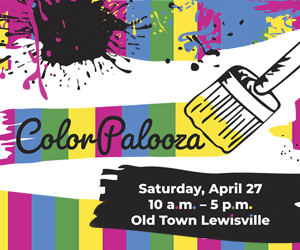Hundreds of miles out in the Pacific Ocean between Hawaii and San Francisco, a new mass has appeared that scientists say is about twice the size of Texas. Visions of Lemuria, the Pacific version of Atlantis come to mind – maybe another island neighbor that we could invade and claim!
But before you get too excited about lost continents or imperialistic opportunism, you should know that the new mass is 80 percent plastic – mostly mainland trash – and that it’s commonly referred to as the Great Pacific Garbage Patch. It has been roiling and growing out there for years, getting bigger and wider – but, hey, out of sight out of mind, right? Especially for us. We don’t even live on the West Coast; we live in Fort Worth, where the West begins.
Unfortunately, the West begins kind of like it ends. As you drive out west on Camp Bowie Boulevard, you see your first large, rolling prairie hill on the skyline to your left, with what looks like a road running down the side. Actually, it’s a plastic-lined runoff ditch, and the “prairie hill” is a man-made mound, built to conceal a waste disposal site. The sign in front of the mound says “Westside Transfer Station,” better known as a landfill.
Behind the pseudo-prairie hill are tons and tons of the residue of our existence. We put it in bags, drop the bags in trash cans, put the cans out next to the curb and – presto! When we get home from work, the cans are empty and ready to refill.
Like so many processes and phenomena that play a part in our lives, we don’t concern ourselves with end results. We simply focus on convenient means. We have mouths to feed, lives to lead, and places to be, so we embrace any process or product that increases our existential leisure, regardless of whether it’s environmentally destructive, wasteful, or toxic.
A few years back, my parents asked me to take a load of brush they had cut down on their property out to the Westside dump. I paid at the gate and drove up the hill. Once atop it, a panorama of piled garbage was revealed, populated by bulldozers pushing the refuse into a pit.
If you haven’t been to a garbage dump, especially a fresh one, there’s no way to convey the stench. The odor is thick and nauseating, smelling like decadence and death, with whiffs of extinction. Needless to say, I dumped my brush and got out of there as fast as I could.
The average American creates four pounds of trash a day. Nationally, that’s 600,000 tons every 24 hours, 210 million tons per year. Thirty percent of it gets reused or recycled, but the rest goes into garbage dumps, landfills, and our lakes, rivers, and oceans. With approximately 700,000 of us in Cowtown, we produce 1,400 tons of solid waste per day; after recycling, 1,000 tons go into “transfer stations.” A thousand tons. Per day.
The Westside Transfer Station is pretty big, but it’s going to take hundreds more just like it to keep us from drowning in our own garbage over the next generation. And when these dumps are full, they usually just get covered up. Eventually, many of them contaminate groundwater, aquifers, soil, and air. The Westside Transfer Station is within a half-mile of Mary’s Creek to the north and two miles of South Mary’s Creek, both of which feed into the Trinity. Will our great-grandchildren’s drinking water contain traces of the trash we set out on the curb today?
My 9-year-old son’s class is taking a field trip to the UTA planetarium this week. It will be educational and fun, but I have a suggestion: Make the transfer station the first stop. As the kids take in the sights and smells, the teachers can emphasize the importance of cutting back, recycling, and composting. Then, when the kids get to the planetarium they’ll understand better why space is so important – clearly we’ll have to move out there someday.
We’ll have to move to escape the planet we’ve poisoned and left virtually uninhabitable, eventually to become a future generation’s myth of Atlantis, sinking below the garbage.
Unless, perhaps, our kids get the picture – sooner rather than later – and turn us around.
E. R. Bills is a Fort Worth-area freelance writer.











